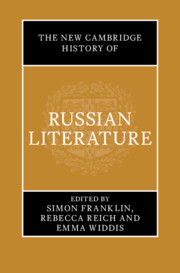Book contents
- The New Cambridge History of Russian Literature
- The New Cambridge History of Russian Literature
- Copyright page
- Contents
- Figures
- Contributors
- Acknowledgements
- On Transliteration, Names, and Dates
- Introduction
- History 1 Movements
- History 2 Mechanisms
- History 3 Forms
- 3.1 Forms before Genres
- 3.2 Folk Genres
- 3.3 Verse I
- 3.4 Drama I
- 3.5 The Novel I
- 3.6 The Short Story
- 3.7 Drama II
- 3.8 Verse II
- 3.9 The Novel II
- 3.10 Self-Writing
- 3.11 (Plat)forms after Genres
- Boxes 5 Critical Frames
- Boxes 6 Literature beyond Literature
- History 4 Heroes
- Index
Boxes 6 - Literature beyond Literature
from History 3 - Forms
Published online by Cambridge University Press: 31 December 2024
- The New Cambridge History of Russian Literature
- The New Cambridge History of Russian Literature
- Copyright page
- Contents
- Figures
- Contributors
- Acknowledgements
- On Transliteration, Names, and Dates
- Introduction
- History 1 Movements
- History 2 Mechanisms
- History 3 Forms
- 3.1 Forms before Genres
- 3.2 Folk Genres
- 3.3 Verse I
- 3.4 Drama I
- 3.5 The Novel I
- 3.6 The Short Story
- 3.7 Drama II
- 3.8 Verse II
- 3.9 The Novel II
- 3.10 Self-Writing
- 3.11 (Plat)forms after Genres
- Boxes 5 Critical Frames
- Boxes 6 Literature beyond Literature
- History 4 Heroes
- Index
Summary
The Tale of Igor’s Campaign (Slovo o polku Igoreve) is a literary text that has acquired emblematic significance far beyond literature, in discourses of cultural and national identity in both Russia and Ukraine. It is short, fewer than ten pages of modern printed text, yet its status is incalculable. Its subject is not, on the surface, a hugely consequential event: a failed foray against the steppe nomads in 1185 led by a minor prince of the Rus ruling family, Igor Sviatoslavich of Novgorod-Seversk. Yet in the lyrical imagination, the episode acquires almost cosmic resonance. In the densely metaphorical narrative, nature itself participates and responds. Rus princes and nomad chieftains are falcons and wild oxen, skies darken, lances sing, rivers are invoked as if people, and the fingers of a bard are falcons descending upon swans.
- Type
- Chapter
- Information
- The New Cambridge History of Russian Literature , pp. 669 - 680Publisher: Cambridge University PressPrint publication year: 2024

